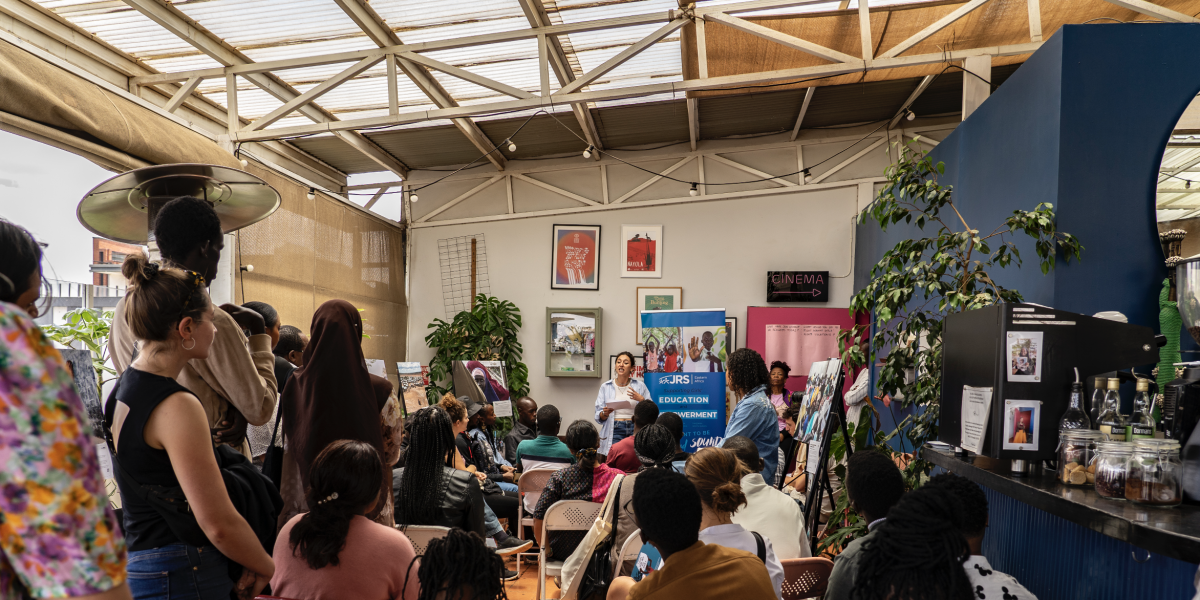
On Saturday October the 7th, JRS Eastern Africa hosted and Advocacy and Communications event in Nairobi. And it was a success!!
The purpose of the event was to present the book of testimonies of girls we developed this year, I Will Tell You My Story: voices of Eastern African girls, while putting some light on the realities of violence that girls suffer in Eastern Africa, and worldwide. Its ultimate aim was to call for the action of the attendants to the event into fighting against this reality in any way possible.
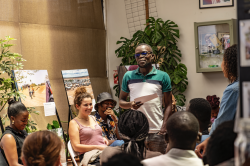
With the support of some of our colleagues of JRS Kenya, we shared six different short stories of young girls around the world: from Uganda, Pakistan, Chad, Kenya, Ukraine and Guatemala, who have suffered different kinds of violence (menstruation as a taboo, school deprivation, forced marriage or sexual violence being some of them).
This, with the intention of being their advocators and spokespersons, of giving them a space to share despite from the distance… since girls have historically been silenced and left aside.
Parallel, we had set up a small photography exhibition to show some of the work we do with girls and women in the region, and we enjoyed of some life acoustic music.
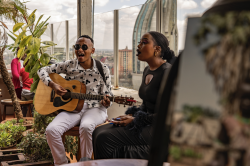
I Will Tell You My Story: voices of Eastern African girls
As part of JRS’ efforts to advocate for the cause of girls in our region, we had recently edited and published the book of stories and testimonies above mentioned, “I Will Tell You My Story”.
On it you can find six different testimonies of girls in our region who explain different kinds of violence suffered by them. Each testimony focused on one topic or kind of violence. You can also find some calls for action as well as some references to the work we as JRS do with girls in these countries.
The process of developing this book was not simple. We did 5 different focus group sessions with girls under the age of 15 in Ethiopia, Uganda, Kenya and South Sudan, where we invited groups of 5 to 10 girls to share about their life and their experiences of violence. But, how to do it while respecting the Do Not Harm humanitarian principle and avoid just refuelling the trauma these girls went through?
To do so, we counted with the incredibly valuable support of Aliyah Shah, Adolescent Psychologist, who helped us design the dynamics with the girls to ensure they would feel comfortable sharing while leaving the room with a smile in their face despite of having touched very sensitive issues.
Those sessions were amazing. Being with these strong girls, seeing how the spoke up and stood up for their rights, was an incredibly beautiful experience.
Out of those testimonies, we gathered them based on topic and wrote the 6 different stories mentioned earlier, using fake names and personal details, to come up with fictional but at the same time very very real stories of girls in our region.
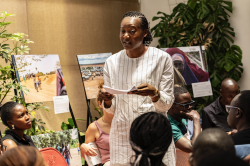
Event I Will Tell You My Story in Nairobi
The event we held early October shinned because of its simplicity. With around 50 to 60 attendees, and after sharing some coffee and tea and enjoying of our company while warming up the mood, we all gathered and sited around the different speakers or spokespersons in the event who were sharing the stories abovementioned.
By avoiding the use of sound systems, and by having a very simple and warm set up, we achieved a mood of intimacy and complicity, which allowed the audience to really connect with the stories of violence and resilience that we shared.
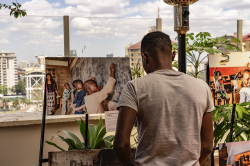
We profited to also share some parts of the book published by Dominique Sigaud and financed by Victoria Gomez, The Curse of Being a Girld Child, that also discusses the same topic we wanted to focus on:
It is her, at the age of barely 7 years, the one who takes care of her younger siblings.
The one who remains without food when there is not enough for all,
The one that for one and a thousand reasons does not go to school.
It is her, who risking her life, goes pick up wood.
Always her, the most unprotected, the most disadvantaged.
[…]Girls in this world are the easiest beings to mistreat, to be possessed, lied, killed, raped, mutilated, prostituted. They are naive and trust giving. They have been taught to obey, to remain silent, to wait for their blue prince, to be the object of men’s desires, to assist their parents, their husbands and their children.
And they have been told the price to pay if they don’t fulfil this.
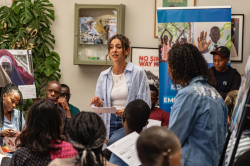
Covid 19 had a dramatic repercussion in the status quo of girls. Confinement reinforced intrafamilial violence. Forced prostitution of minors has been increasing significantly due to the reduction of income of poorest regions.
Female Genital Mutilation as well as child forced marriages have drastically increased in Kenya and in other African countries.
To change that status quo is something that actually, we can do.It is key that girls are not educated to become desirable beings. That they stop being considered the bearers of their family or clan’s honour, and maybe that their families and clans start honouring them.
Humanity has not yet understood that girls are a blessing. Hopefully we can realize before it is too late.
The stories that we shared in that event or in our book of testimonies, despite modifying some personal data for protection issues, are not fiction. On the contrary: they represent the reality of thousands of girls in Africa and around the world.
Some of the realities explained may, to some of the attendants, have been perceived as very distant in space and time, but they are not. Harmful traditional practices can be found all over the world, in underdeveloped, developing and developed countries, regardless.
Forced marriages, early pregnancies, sexual and domestic violence, wars, abductions, gender roles, school deprivation… are only some of the major violations that girls suffer worldwide. And it is our responsibility as humankind to stop them.
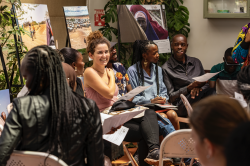
It is urgent that we all join efforts to advocate for this reality and to achieve a profound change in the mindset of our common cultures, where girls are considered second-class persons.
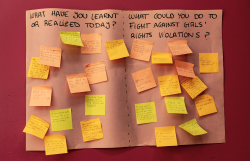
Despite seeming complicated, there are things we can actually do to fight against this reality.
First of all, you can advocate for them: do not forget the struggle of girls around the world, don’t turn your back to it, but share the message, speak up for them, and help others learn about it and be sensitized. And maybe, one of them, one day, will do something because of what you explained them.
Support girls around you: in your family, your neighbourhood, your town… if you witness an episode of injustice or violence, don’t look aside, but act.
Or subcontract your fight: support organizations that work closely with girls’ protection by volunteering, making some donations or even working for them!
The event was magnificent.
People was genuinely touched and moved for what we shared and for the way we shared it. We are confident we fulfilled our objective of not leaving people indifferent. Of offering food of thought to all the people who joined us, and plant a seed that hopefully will grow as time goes.
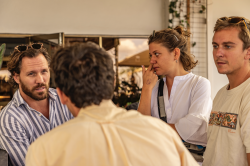
We want to thank to all those who attended and above all, those who in a way or another participated to make this event and this book a reality.
